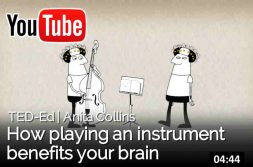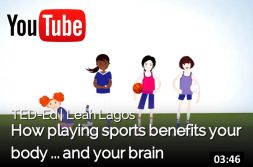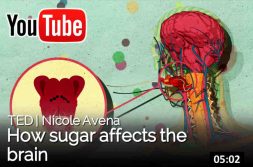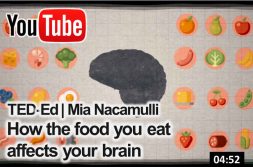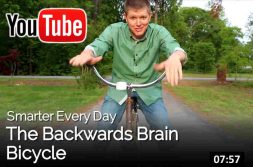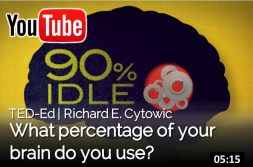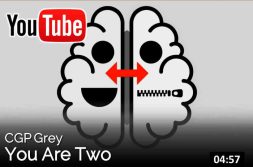Brain
Questions
1. Do you have a quick brain?
2. Do you have a good memory?
3. How much time do you spend inside your brain?
4. What would you say about your own brain?
5. Do you do anything to look after your brain?
6. How often do you tax your brain?
7. How much of your brain do you use?
8. Who is the brains of your family?
9. Do people ever pick your brains?
10. Do you ever have a brainstorm at work?
11. Who is the smartest person you know?
12. Would you rather be street smart or book smart?
13. What did you learn this week?
Videos
When you listen to music, multiple areas of your brain become engaged and active. But when you actually play an instrument, that activity becomes more like a full-body brain workout. What’s going on? Anita Collins
[more]
explains the fireworks that go off in musicians’ brains when they play, and examines some of the long-term positive effects of this mental workout.
Lesson by Anita Collins, animation by Sharon Colman Graham.
Lesson by Anita Collins, animation by Sharon Colman Graham.
[less]
Category: Art | Psychology
The victory of the underdog. The last minute penalty shot that wins the tournament. The training montage. Many people love to glorify victory on the field, cheer for teams, and play sports. But should we be obsessed with
[more]
sports? Are sports as good for us as we make them out to be, or are they just a fun and entertaining pastime? Leah Lagos and Jaspal Ricky Singh show what science has to say on the matter.
Lesson by Leah Lagos and Jaspal Ricky Singh, animation by Kozmonot Animation Studio.
[less]
When you eat something loaded with sugar, your taste buds, your gut and your brain all take notice. This activation of your reward system is not unlike how bodies process addictive substances such as alcohol or nicotine —
[more]
an overload of sugar spikes dopamine levels and leaves you craving more. Nicole Avena explains why sweets and treats should be enjoyed in moderation.
Lesson by Nicole Avena, animation by STK Films.
Lesson by Nicole Avena, animation by STK Films.
[less]
When it comes to what you bite, chew and swallow, your choices have a direct and long-lasting effect on the most powerful organ in your body: your brain. So which foods cause you to feel so tired after lunch? Or so restless
[more]
at night? Mia Nacamulli takes you into the brain to find out.
Lesson by Mia Nacamulli, animation by Private Island.
Lesson by Mia Nacamulli, animation by Private Island.
[less]
How long did it take you to learn how to ride a bicycle? How long do you think it would take you to un-learn how to ride a bicycle? Is it true that you can never forget how to ride a bicycle? How do these biases in your brain
[more]
actually work? With the help of a group of welders, engineer Destin Sandlin created an experiment using a “backwards” bicycle to explore these very questions.
[less]
Category: Psychology | Science
The vast majority of people who’ve lost a limb can still feel it — not as a memory or vague shape, but in complete lifelike detail. They can flex their phantom fingers and sometimes even feel the chafe of a watch band or the
[more]
throb of an ingrown toenail. What causes these phantom limb sensations? Joshua W. Pate explains how the brain reacts to a missing limb.
Lesson by Joshua W. Pate, directed by Kozmonot Animation Studio.
Lesson by Joshua W. Pate, directed by Kozmonot Animation Studio.
[less]
Category: Science
Two thirds of the population believes a myth that has been propagated for over a century: that we use only 10% of our brains. Hardly! Our neuron-dense brains have evolved to use the least amount of energy while carrying
[more]
the most information possible — a feat that requires the entire brain. Richard E. Cytowic debunks this neurological myth (and explains why we aren’t so good at multitasking).
Lesson by Richard E. Cytowic, animation by TOGETHER.
Lesson by Richard E. Cytowic, animation by TOGETHER.
[less]
Category: Science
Keywords: Brain | Statistics
CGP Grey’s exploration of the fascinating disconnect between the right brain and the left brain.
Category: Psychology
